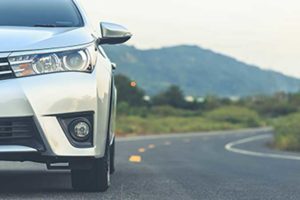
The California seat belt law is found in the Motor Vehicle Code § 27315 and is strictly enforced.
Seat Belts are Required
Under the California seatbelt law, no person can operate a vehicle on a highway unless the driver and all passengers aged 16 or older are wearing a safety belt. This law applies to passengers riding in the front seat as well as in the back.
At a minimum, the seat belt should be a lap belt that crosses at the hips and upper thighs. If there is an upper portion to the belt, then it should cross the chest.
The motor vehicle owner also must make sure to maintain that there are seat belts in the vehicle that works. This law also applies to anyone operating or owning a taxi.
Penalties
The seat belt law in California identifies the penalty that you will have to pay if the police pull you over and you are not wearing a belt:
- $20 fine for a first offense
- $50 fine for each subsequent offense
Instead of paying the fine, you might be able to attend traffic school, where you will learn about traffic safety.
Child Safety Seats
Children have different safety needs, and for that reason, California has created separate seat belt requirements for children. Because restraints save lives, the state will require that you put your child in an appropriate car or booster seat.
The type of seat you need will depend on several factors. Here are the details of the law:
- If your child is younger than 2, you should put them in a rear-facing seat unless the child is large for their age, e.g., 40+ pounds or 40+ inches tall. After age 2, they should be in a forward-facing safety seat.
- If your child is under age 8, then they must be secured in a booster or car seat located in the back seat.
- Children 8 or older, or any child that is 4’9” tall, can also be secured in a booster seat. If you choose not to use a booster seat, then but at a minimum,q the child must wear a safety belt.
- Children 16 or older must follow the seat belt law in California as described above.
Some questions arise about when a child can move on from a car seat that has a five-point harness to a booster seat. California law does not lay out precisely when you should make this move.
Instead, the state recommends that you take things slow. Graduating your child to a booster seat actually decreases the amount of restraint and safety they have, so California recommends that you keep your child in their current seat for as long as possible.
California also provides some basic guidance:
Your child is ready for a booster seat when they have surpassed the limits for a forward-facing harness, typically between 40 and 65 pounds. Children should stay in their booster seat until they are at least 4’9” tall and 8-12 years old.
Remember that safety belts were designed for men around 165 pounds, so the belts are an awkward fit for smaller children.
Seat Belts and Car Accidents
California is a pure comparative negligence state. This means that the law recognizes that a car accident victim could have contributed to their accident or injuries. The victim can still sue, but their own negligence will reduce the amount of compensation they can receive.
Under the state’s seat belt law, failure to wear a seat belt is not per se proof of negligence. This means the driver cannot point to your failure to wear a seat belt as automatically proving you were negligent. However, a jury can still use the fact that you were not wearing a seatbelt to find that you contributed to your injuries. For this reason, wearing a seatbelt not only protects you but protects your right to compensation in the event of a collision.
Speak to a Long Beach Car Accident Lawyer
At the Beliz Law Firm, we have helped countless accident victims get the compensation they deserve. Please reach out to us today for a free consultation. One of our Long Beach car accident lawyers will be happy to meet with you to discuss your case as well as your options for compensation.
Call 562-452-3772.
